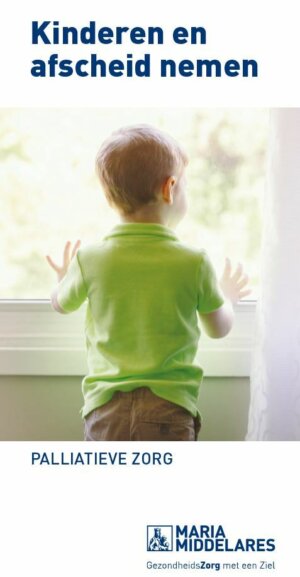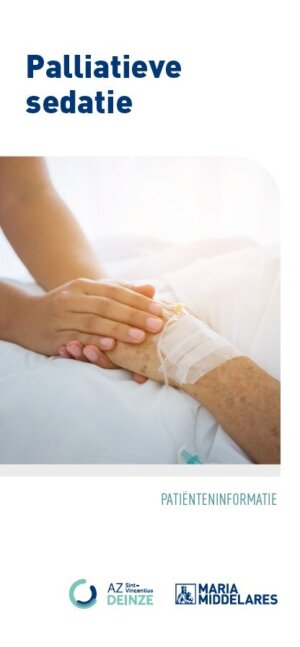Palliative case and advance care planning
Advance care planning
Advance care planningEverybody is free to conduct advance care planning. This means that all patients (including those not in a palliative phase) can make arrangements in relation to end-of-life questions or questions about whether to continue treatment in specific situations and, if applicable, write a will.
Do you want to write a will? You can do so in our hospital by consulting your attending physician or make an appointment with a nurse of the Palliative Care Support Team (+32 (0)9 246 27 50). They will give you the necessary explanations and, where necessary, guide you in arranging a number of important documents (e.g. health and end-of-life living wills, including negative living wills, euthanasia living wills and organ donation statements).
If a patient has a will, this will be recorded in their medical record.
Palliative care
Palliative careThe care that is provided by a hospital does not end when a patient can no longer recover from their illness and are approaching the end of life. A lot can still be done for patients: in medical and nursing terms, psychologically and socially and in the context of faith and spirituality. The combination of all this care at the end of life is called palliative care. Such care is also associated with important ethical decisions. At Maria Middelares General Hospital, these choices are also motivated by the hospital’s motto ‘Compassionate Care’, against a background of a Christian view on life. Below, we want to communicate clearly what the patient may expect from us on this context.
Integration of palliative care into each department
Patients for whom recovery is no longer possible are surrounded with the most meticulous care at Maria Middelares General Hospital. Maria Middelares General Hospital does not have a separate Palliative Care Ward in the hospital. We integrate palliative care on every ward. During this phase of life, we want to offer humane, total care that takes account of the physical, ethical, mental, social and spiritual needs of the patients and their loved ones. Even if a (young) (small) child is involved in the farewell, we want to support the family as best we can.
Only available in Dutch:

Kinderen en afscheid nemen
DownloadMaria Middelares General Hospital encourages a palliative care culture that is based on a Christian view of life that considers the life of each person to be valuable from start to finish. Every colleague is involved in this palliative care culture. Precisely because of this vision, we respect a diversity of ethical viewpoints and we want to offer a caring response to each question about and around the end of life.
Palliative sedation and euthanasia
Palliative sedation and euthanasiaIt is important to make a clear distinction between these two concepts.
- Palliative sedation means inducing sleep in terminal patients who suffer distress during the dying phase (pain, shortness of breath, hiccups, exhaustion, panic, etcetera) and for whom ‘normal’ medication no longer can provide enough comfort. To offer maximum comfort, sleep medication is administered, ensuring the patient is asleep and no longer experiences intolerable distress.
- Euthanasia means the act of intentionally ending life by another person than the person themselves, at their explicit request. Euthanasia is not a patient’s right. The patient may ask for it within a legally specified framework, but a physician is never obliged to comply with the request. At Maria Middelares General Hospital, the implementation of euthanasia can only be considered after all possibilities offered by palliative care have been exhausted, and for terminally ill patients with limited life expectancy (up to three months).
How do we deal with requests?
At Maria Middelares General Hospital, every request for euthanasia is taken seriously. The request and its motives are further explored according to a careful procedure. After that, the patient takes a final decision on whether or not he or she wants to continue the procedure. If the request for euthanasia cannot be met within our organisation, the patient receives support in the search for an alternative solution, which may involve referral.
Euthanasia requests by patients who experience intolerable suffering as a result of an irreversible physical condition but who are not expected to die in the foreseeable future, are also always taken seriously and listened to. However, euthanasia cannot be implemented at Maria Middelares General Hospital in this non-terminal context. For these patients, the physician, together with the Palliative Care Support Team, will provide a report of their findings to the GP and the (palliative) home care agency.
Euthanasia requests from patients experiencing intolerable psychological suffering will also be heard but, as an acute hospital, the Maria Middelares General Hospital does not have the structural framework to thoroughly explore and evaluate the request. In this case, patients are referred to a more suitable context to deal with this request further.
At Maria Middelares General Hospital, euthanasia is not performed for minors.
Decisions regarding the end of life are always taken in the context of a relationship of trust with the physician. The closest relatives are also involved in this. Multidisciplinary support by the Palliative Care Support Team is available to the patient and relatives during this process.
Only available in Dutch:

Palliatieve sedatie
DownloadThis support team consists of several nurses, palliative physicians, a psychologist and a pastoral support worker. Through practical experience, specific training and frequent joint meetings, the members of the team have gained knowledge and expertise in supporting patients and their loved ones in these circumstances.
The team has weekly patient meetings and supports communication with and between patient, physician and relatives.
Who can contact the team?
All inpatients, including those who are not in a palliative stage but who have questions about the end of life, can contact the Palliative Care Support Team. The attending physician remains the central point of contact, including for palliative patients.
Hoe gaan we om met vragen?
In AZ Maria Middelares wordt elke vraag naar euthanasie ernstig genomen. De vraag en haar beweegredenen worden verder verkend volgens een zorgvuldige procedure. Hierna beslist de patiënt definitief of hij de procedure al dan niet wil verderzetten. Indien in onze organisatie niet kan ingegaan worden op de vraag naar euthanasie, wordt de patiënt begeleid in het zoeken naar een alternatieve oplossing, die ook doorverwijzing kan inhouden.
Euthanasievragen van patiënten die ondraaglijk lijden ten gevolge van een onomkeerbare fysieke aandoening maar die niét zouden overlijden binnen afzienbare tijd, worden ook altijd ernstig genomen en beluisterd. In deze niet-terminale context kan euthanasie echter niet in AZ Maria Middelares worden uitgevoerd. De arts zal samen met het palliatief support team voor deze patiënten een verslag bezorgen van hun bevindingen aan de huisarts en de (palliatieve) thuiszorg.
Patiënten met ondraaglijk psychisch lijden zullen in hun verzoek om euthanasie eveneens gehoord worden, maar het AZ Maria Middelares heeft als acuut ziekenhuis niet de structurele omkadering om de vraag voldoende grondig te exploreren en te evalueren. Hier zal worden doorverwezen naar een beter geschikte context voor de verdere omgang met deze vraag.
In AZ Maria Middelares wordt geen euthanasie uitgevoerd op minderjarigen.
Beslissingen over levenseindezorg worden steeds in de vertrouwensrelatie met de arts genomen. Daarbij worden ook de dichtste naasten betrokken. Er is multidisciplinaire ondersteuning vanuit het palliatief support team beschikbaar voor patiënt en naasten gedurende dit proces.
Palliatief support team
Palliatief support teamDit ondersteunende team bestaat uit een aantal verpleegkundigen, palliatieve artsen, een psycholoog en een pastorale medewerker. Door praktijk, specifieke scholing en veelvuldig gezamenlijk overleg hebben de leden van het team kennis en ervaring opgebouwd in het begeleiden van patiënten en hun naasten in deze omstandigheden.
Het team houdt wekelijks patiëntenbesprekingen en ondersteunt communicatie met en tussen patiënt, arts en naasten.
Wie kan bij het team terecht?
Alle gehospitaliseerde patiënten, ook diegenen die niet in een palliatieve situatie verkeren maar zich vragen stellen over het levenseinde, kunnen een beroep doen op het palliatief support team. De behandelende arts blijft de centrale aanspreekpersoon, ook voor de palliatieve patiënt.
Contact
ContactPalliatieve artsen
Palliatief zorgcoördinator
Palliatieve verpleegkundigen
Pastor
Psycholoog
Je kan deze teamleden ook bereiken via een verpleegkundige op de afdeling.













